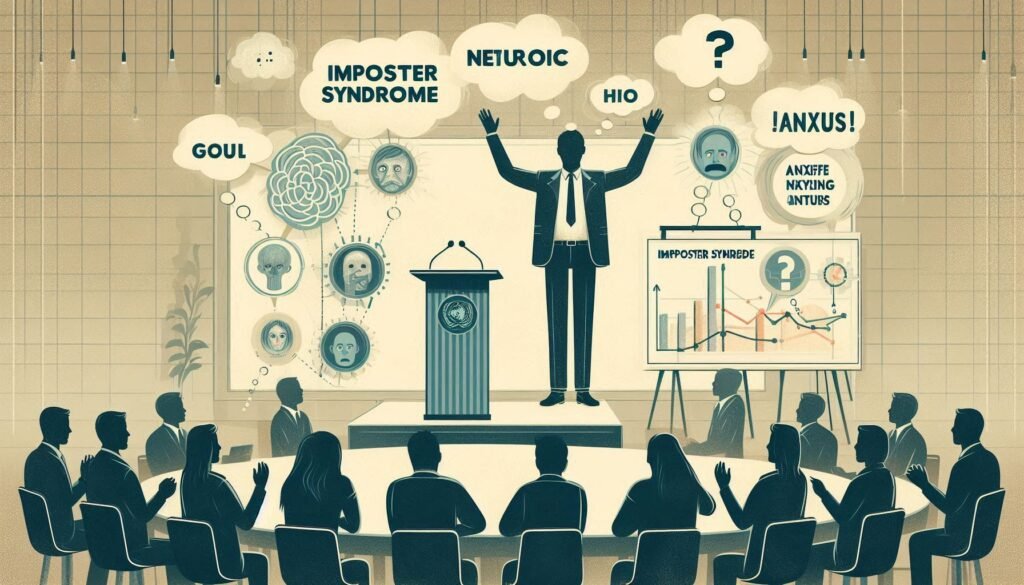In today’s fast-paced work environment, the ability to bounce back from setbacks is more crucial than ever. Neuroticism—a personality trait characterized by emotional instability—can pose challenges in maintaining workplace resilience. However, understanding neurotic tendencies can also reveal pathways toward building mental toughness and thriving amidst adversity.
Imagine a team member who feels overwhelmed by stress or anxiety when facing tight deadlines or unexpected changes. While neurotic individuals might struggle initially, they often possess unique insights into their emotions that can be harnessed for personal growth and greater resilience. By focusing on strategies that foster emotional regulation and cognitive restructuring, organizations can empower these employees to turn their vulnerabilities into strengths.
This exploration of neuroticism and workplace resilience will delve into essential components of mental toughness while providing practical techniques for developing it in challenging environments. Join us as we uncover how to cultivate a resilient workforce equipped to handle obstacles with confidence!

Understanding Neuroticism and Its Impact on Workplace Resilience
Neuroticism is a personality trait that reflects an individual’s tendency to experience negative emotions such as anxiety, fear, and mood swings. Those high in neuroticism often find themselves reacting more intensely to stressors compared to their more emotionally stable peers. This heightened emotional sensitivity can significantly influence how they respond in the workplace.
In environments filled with pressures and deadlines, neurotic individuals may struggle with resilience. Their tendency for rumination can lead to increased feelings of self-doubt and overwhelm during challenging situations. As a result, this can hinder productivity and affect overall job satisfaction.
However, it’s essential to recognize that neuroticism isn’t solely detrimental. These individuals often display strong awareness of their emotions, which can be leveraged for personal growth when guided effectively. By understanding their unique perspectives on stressors, organizations can foster resilience through tailored support systems.
Acknowledging the impact of neuroticism helps create a balanced approach toward building mental toughness among employees facing daily challenges.
The Concept of Mental Toughness: Key Components and Benefits
Mental toughness is a psychological edge that enables individuals to cope with stress, pressure, and setbacks effectively. It involves resilience, confidence, focus, and a strong sense of purpose. These components work together to help employees navigate workplace challenges with greater ease.
Resilience allows individuals to bounce back from difficulties while maintaining their performance levels. Confidence fosters belief in one’s abilities, motivating staff to tackle problems head-on. Focus helps keep attention on goals rather than distractions or negative thoughts that can arise in stressful situations.
Developing mental toughness leads to numerous benefits for both employees and organizations. When team members are mentally tough, they tend to perform better under pressure and show increased adaptability during change. This ability not only enhances individual productivity but also contributes positively to overall team dynamics.
Additionally, cultivating mental toughness supports employee well-being by reducing anxiety and promoting job satisfaction. As workers become more adept at managing stressors, they experience improved engagement and motivation within the workplace environment.
Assessing Resilience Levels in Neurotic Employees
Assessing resilience levels in neurotic employees can reveal valuable insights into their emotional health and job performance. Understanding the nuances of neuroticism is crucial for identifying areas where individuals may struggle under pressure. Tools such as self-report questionnaires or behavioral assessments can help gauge how they respond to stress.
Observing reactions during challenging situations also provides critical information. Neurotic individuals may exhibit heightened anxiety or frustration, making it easier to spot patterns that indicate lower resilience. Tracking these responses over time allows managers to recognize trends in behavior.
Engaging in one-on-one discussions with employees offers further clarity on their mental state. Creating a safe space for open dialogue encourages honesty about feelings and coping strategies. This interaction not only builds trust but also helps identify specific support needs.
Team dynamics are another essential factor; observing how neurotic team members interact with others can shed light on their resilience levels. Collaborative environments often provide insight into an individual’s ability to bounce back from setbacks while fostering camaraderie among colleagues.
Strategies for Developing Emotional Regulation in the Workplace
Emotional regulation is crucial for neurotic individuals in the workplace. Developing strategies can significantly enhance resilience and overall job performance. One effective approach is to practice self-awareness. Encourage employees to identify their emotional triggers and understand how they react under stress.
Another strategy involves creating a structured response plan for challenging situations. Having predefined methods, such as deep breathing or stepping away briefly, helps employees manage intense emotions more effectively. This preparation reduces impulsive reactions and promotes thoughtful responses.
Regular check-ins can also foster an emotionally supportive environment. Managers should encourage open discussions about feelings related to work challenges, allowing team members to express concerns without fear of judgment. This promotes collective emotional intelligence within teams.
Incorporating emotion-focused techniques like journaling can be beneficial. Writing about daily experiences allows individuals to process thoughts and feelings constructively while providing insight into patterns that may hinder resilience in stressful circumstances.
Cognitive Restructuring Techniques for Enhancing Resilience
Cognitive restructuring is a powerful technique in enhancing resilience, particularly for individuals with neurotic tendencies. This approach involves identifying negative thought patterns and replacing them with more balanced perspectives. Recognizing irrational beliefs can be the first step toward fostering mental toughness.
One effective method is to challenge catastrophic thinking. When faced with setbacks, it’s common to envision worst-case scenarios. Encouraging employees to question these thoughts can help them see alternatives that are less drastic and more realistic.
Another technique is reframing situations. Instead of viewing challenges as threats, they can be interpreted as opportunities for growth or learning experiences. This shift in perception not only reduces anxiety but also cultivates a proactive mindset.
Practicing gratitude plays an essential role in cognitive restructuring. By focusing on positive aspects of their lives—even during tough times—neurotic employees can build emotional resilience and develop stronger coping strategies when facing workplace challenges.
Building a Growth Mindset: Overcoming Neurotic Tendencies
A growth mindset is essential for overcoming neurotic tendencies that can hinder workplace resilience. Embracing challenges rather than avoiding them fosters an environment where individuals feel empowered to learn and grow. This shift in perspective allows neurotic employees to view setbacks as opportunities, reducing anxiety associated with failure.
Encouraging a culture of learning can significantly impact how neurotic individuals respond to stressors. When they perceive difficulties as chances for development, their emotional responses become more manageable. This transformation helps cultivate mental toughness necessary for navigating workplace challenges.
Promoting self-reflection further enhances the process of building a growth mindset. Neurotic individuals should assess their thoughts and behaviors regularly, identifying patterns that trigger anxiety or doubt. By recognizing these triggers, they can consciously choose alternative responses that align with a growth-oriented approach.
Providing constructive feedback plays a vital role in this journey. Encouragement from peers and supervisors reinforces positive behavior changes while helping to dismantle negative thought processes often linked with neuroticism.
The Role of Social Support in Fostering Resilience for Neurotic Individuals
Social support plays a crucial role in fostering resilience among neurotic individuals. When faced with stress or adversity, having a reliable network can significantly buffer negative experiences. Friends, family, and colleagues provide emotional reassurance that alleviates anxiety and promotes a sense of belonging.
Neurotic employees often experience heightened sensitivity to stressors. Supportive relationships can validate their feelings, making challenges feel more manageable. Encouragement from peers helps them stay motivated during tough times while reinforcing positive coping mechanisms.
Creating an environment where social interaction flourishes is essential for building workplace resilience. Team-building activities and open communication channels facilitate connections among employees, enabling them to share their experiences and strategies for overcoming difficulties.
Moreover, mentoring programs can enhance the impact of social support by pairing neurotic individuals with experienced mentors. This guidance fosters personal growth and instills confidence as they navigate workplace challenges together, ultimately contributing to long-term mental toughness.
Stress Inoculation Training: Preparing for Workplace Challenges
Stress Inoculation Training (SIT) is an effective method for enhancing workplace resilience, particularly among neurotic individuals. This psychological strategy involves exposing employees to manageable stressors in a controlled environment. By gradually increasing the intensity of these challenges, participants learn to cope more effectively with future pressures.
The training typically consists of three phases: conceptualization, skills acquisition, and application. During the first phase, employees identify specific stressors they face at work. Next, they acquire coping techniques such as problem-solving or relaxation methods. They apply these strategies in simulated scenarios that mimic real-life challenges.
This proactive approach helps neurotic individuals develop mental toughness by transforming their reactions to stress from negative to positive ones. As a result, they can tackle obstacles without becoming overwhelmed or paralyzed by anxiety.
Implementing SIT fosters a culture of resilience within teams and organizations. It empowers employees not just to endure challenges but also thrive despite them.
Mindfulness and Meditation Practices for Enhancing Workplace Resilience
Mindfulness and meditation practices play a crucial role in enhancing workplace resilience, particularly for individuals grappling with neuroticism. By cultivating awareness of the present moment, employees can reduce anxiety and improve emotional regulation. This shift enables them to respond more effectively to stressors.
Regular mindfulness exercises can include breathing techniques or guided imagery sessions. These practices help create an internal space where negative thoughts lose their power. Employees learn to observe their feelings without becoming overwhelmed by them.
Meditation fosters a sense of calmness that extends beyond individual practice into the work environment. As staff members become more adept at managing their emotions, they contribute positively to team dynamics and collaboration.
Incorporating short mindfulness breaks during the workday can be highly beneficial as well. Taking brief moments throughout the day allows individuals to reset and refocus, ultimately leading to enhanced productivity and resilience against challenges that arise in high-pressure situations.
Long-term Resilience Building: Creating Sustainable Practices for Neurotic Employees
Creating sustainable practices for neurotic employees is essential for fostering long-term workplace resilience. Organizations can implement various strategies to support these individuals and help them thrive in challenging environments.
Regular training sessions focusing on emotional intelligence can equip neurotic employees with the tools necessary to manage their emotions effectively. This could include workshops on stress management techniques or conflict resolution skills.
Moreover, incorporating flexibility into work schedules allows employees to balance personal responsibilities with job demands. Such adjustments can significantly reduce anxiety levels while enhancing overall productivity.
Establishing mentorship programs offers additional support. Pairing neurotic individuals with seasoned colleagues helps provide guidance and encouragement during difficult times. Through shared experiences, they can learn coping mechanisms from those who have successfully navigated similar challenges.
Evaluating organizational culture is equally important. Creating an environment that values open communication fosters trust among team members, allowing neurotic employees to voice concerns without fear of judgment.
Integrating wellness initiatives such as yoga classes or healthy lifestyle challenges promotes physical health alongside mental well-being. By prioritizing holistic development within your workforce, you empower all employees – including those prone to neuroticism – to build lasting resilience against workplace pressures.


